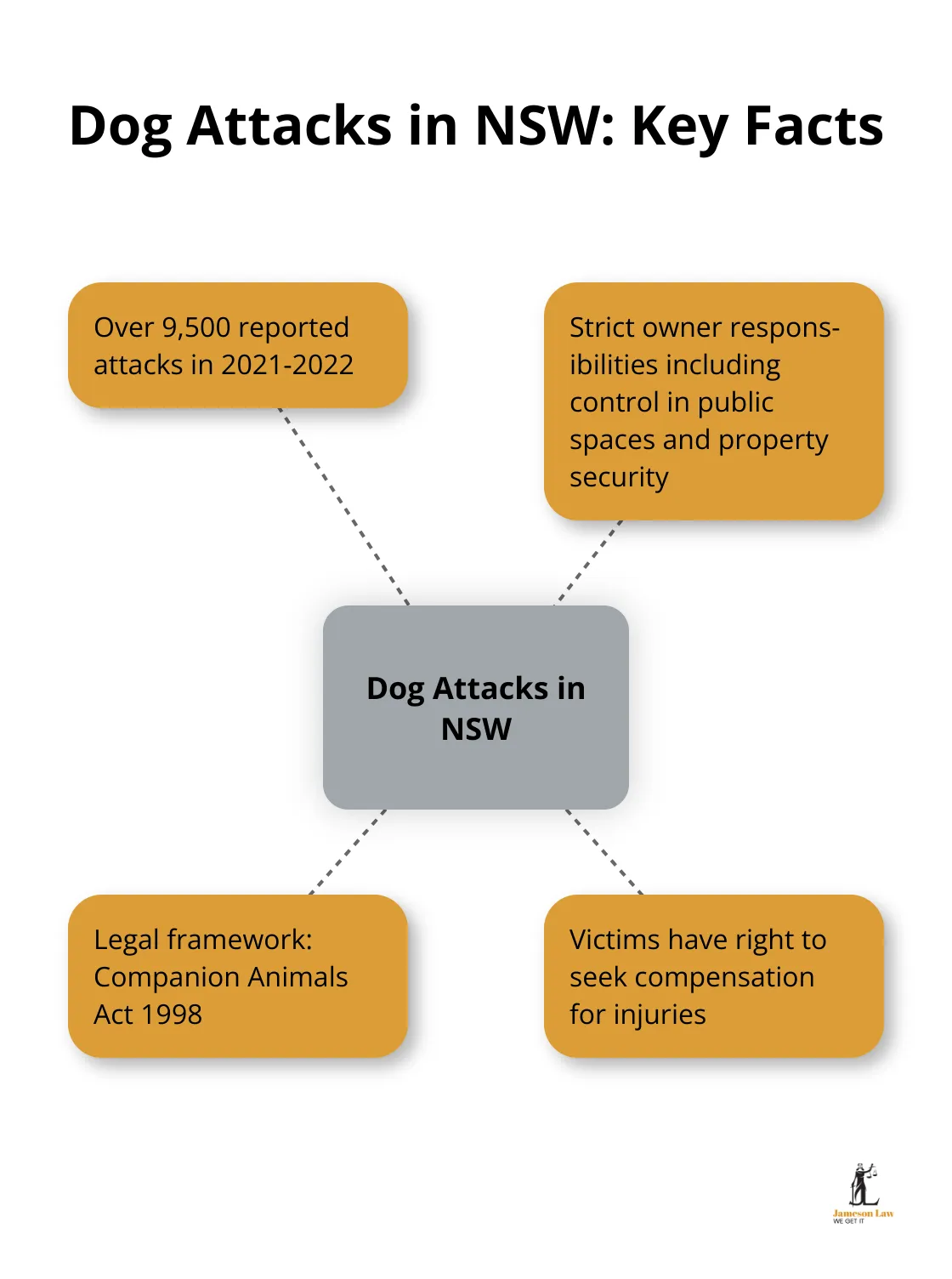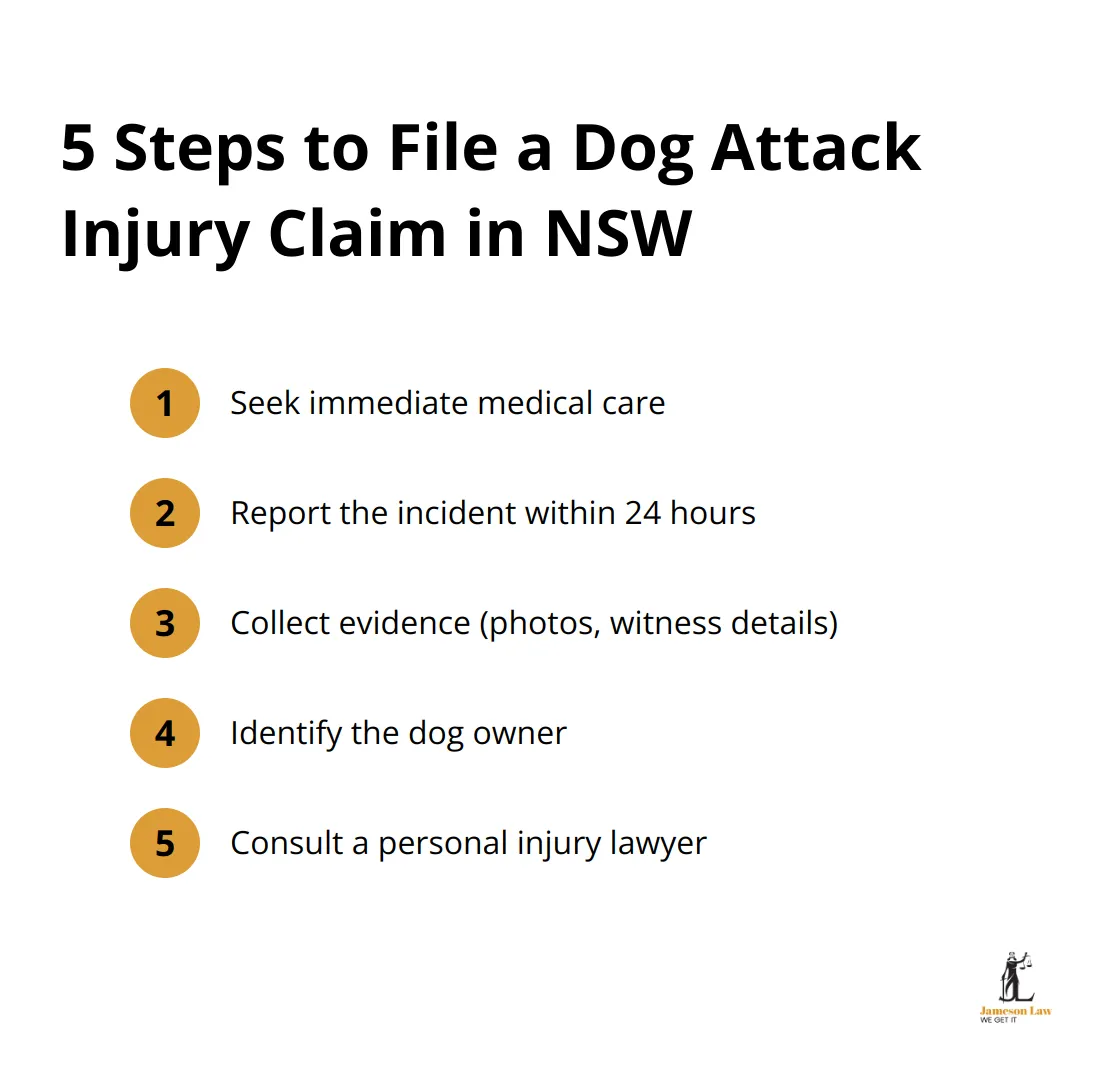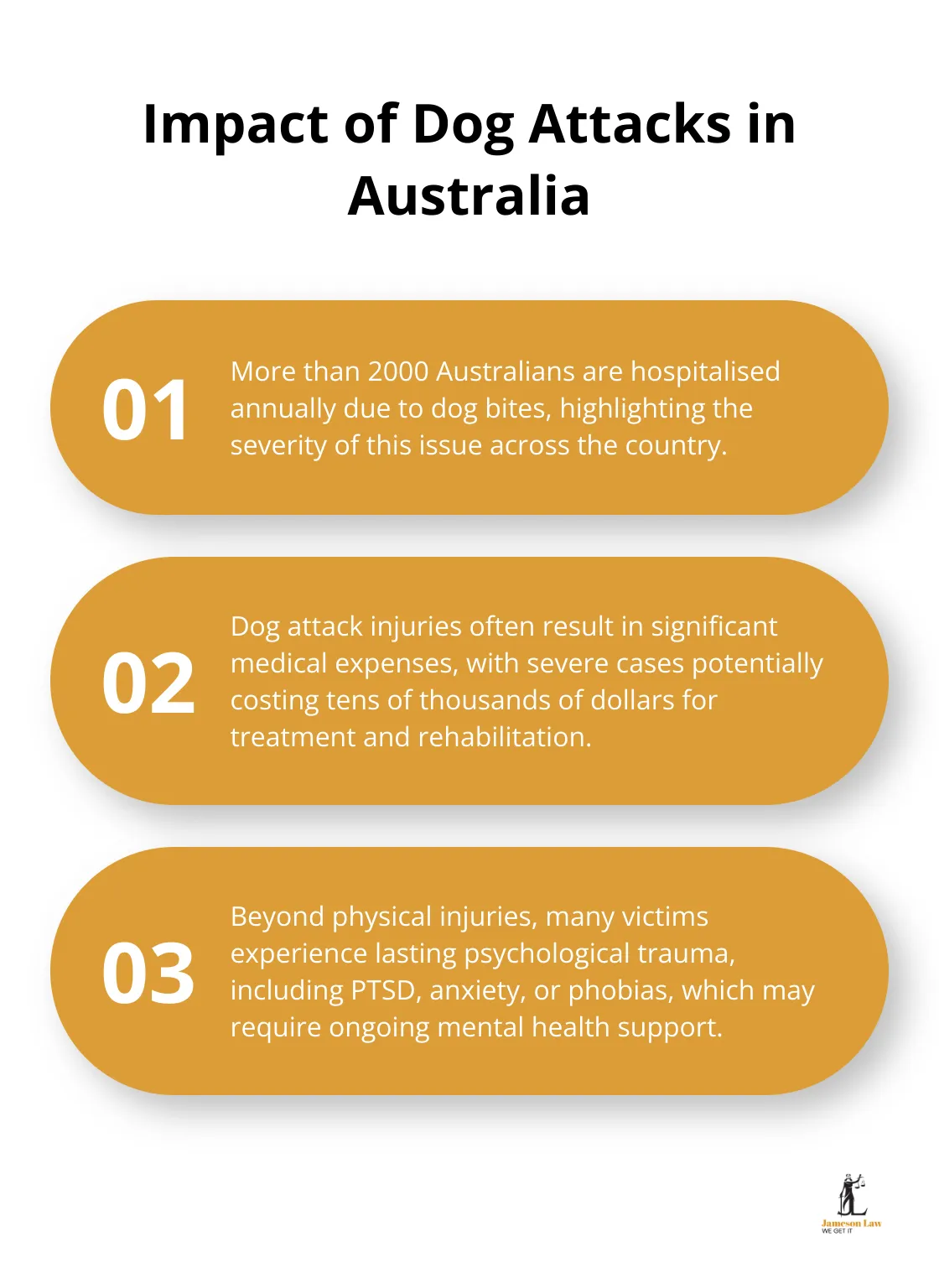Dog attacks can be traumatic experiences, leaving victims with physical injuries and emotional scars. In New South Wales, understanding your rights and the legal process for filing dog attack injury claims is essential.
At Jameson Law, we’ve helped numerous clients navigate the complexities of these cases. This guide will walk you through the steps to file a claim, outline available compensation, and provide crucial insights to protect your interests after a dog attack incident.
What Are NSW Dog Attack Laws?
Legal Framework in New South Wales
In New South Wales, the Companion Animals Act 1998 governs dog attack laws. This legislation establishes strict rules for dog owners and provides a framework for victims to seek compensation.
Dog Owner Responsibilities
Dog owners in NSW have a legal duty to prevent their pets from causing harm. This includes:
- Keeping dogs under control in public spaces
- Ensuring their property is secure
- Registering and microchipping their dogs
Failure to meet these obligations can result in hefty fines and potential criminal charges.
Incident Statistics
The NSW Government reports that in 2021-2022, over 9,500 dog attacks were reported. This high number underscores the importance of responsible pet ownership and the need for robust legal protections for victims.

Common Dog Attack Injuries
Dog attacks can cause a range of injuries, from minor scratches to life-threatening wounds. According to the Australian Institute of Health and Welfare, the most frequent injuries include:
- Lacerations and puncture wounds
- Fractures (particularly in older victims)
- Infections
- Psychological trauma, including post-traumatic stress disorder
These injuries often require immediate medical attention and can lead to long-term physical and emotional consequences. In severe cases, victims may need reconstructive surgery or ongoing psychological treatment.
Legal Recourse for Victims
If you’ve suffered injuries in a dog attack, you have the right to seek compensation. The NSW legal system allows victims to claim for medical expenses, lost wages, and pain and suffering. However, the process can be complex, and time limits apply.
The impact of dog attacks on victims and their families can be devastating. An experienced legal team can guide you through the legal process, ensuring you understand your rights and receive the compensation you deserve.
Prompt action is key in dog attack cases. Reporting the incident to local authorities and seeking legal advice early can significantly strengthen your claim. The law supports victims of dog attacks, and with the right legal representation, you can focus on recovery while your lawyer handles the complexities of your case.
As we move forward, let’s explore the specific steps you need to take when filing a dog attack injury claim in NSW.
How to File a Dog Attack Injury Claim
Seek Immediate Medical Care
Your health is the top priority after a dog attack. Visit a doctor or hospital right away, even if your injuries appear minor. Research has shown that owned dogs delivered more bites, were larger, bit more victims on the head and neck, and delivered more bites needing medical treatment. Swift treatment protects your health and creates a medical record (essential for your claim).
Report the Incident
Contact your local council and the police to document the attack officially. The NSW Office of Local Government requires all dog attacks to be reported within 24 hours. This report establishes a timeline and creates an official record of the incident (critical for your claim).
Collect Evidence
Gather as much evidence as possible:
- Take photos of your injuries
- Capture images of the attack location
- Photograph the dog (if safe to do so)
- Obtain contact details from witnesses
- Keep all medical records, including bills and treatment plans
This evidence forms the foundation of your claim.
Identify the Dog Owner
Try to obtain the dog owner’s details. If you can’t, your local council may assist you. The owner’s identity is vital for your claim, as they’re typically liable for their dog’s actions under NSW law.
Consult a Legal Expert
Speak with a personal injury lawyer experienced in dog attack cases. They will guide you through the complex legal process, ensure you meet all deadlines, and help maximise your compensation. Many law firms, including Jameson Law, offer a No Win No Fee policy for personal injury claims, making legal representation accessible to all dog attack victims.
Time is of the essence in dog attack cases. In NSW, you have three years from the date of the attack to file a claim. However, starting the process early gives you the best chance of a successful outcome.

Now that you understand the steps to file a dog attack injury claim, let’s explore the types of compensation available to victims in NSW.
What Compensation Can Dog Attack Victims Claim?
Medical Expenses and Ongoing Care
Dog attack victims in NSW can claim compensation for various medical expenses. This includes immediate treatment costs (emergency room visits, surgeries, medications) and ongoing medical care (physiotherapy, rehabilitation, future surgeries).
More than 2000 Australians are hospitalised annually due to dog bites. These incidents often result in significant medical expenses. A severe dog bite requiring reconstructive surgery can cost tens of thousands of dollars.

Victims should maintain detailed records of all medical treatments and expenses related to their injuries. This documentation strengthens their compensation claim.
Lost Income and Future Earnings
Dog attack injuries can force victims to take time off work, resulting in lost wages. In severe cases, injuries may affect a person’s ability to return to their previous job or work capacity. Compensation claims can cover both immediate lost income and potential future earnings losses.
The Australian Bureau of Statistics reports that the average weekly earnings in Australia as of May 2023 were $1,838.80. For a victim unable to work for several weeks or months, the financial impact can be substantial. In long-term disability cases, the compensation may factor in career progression and potential salary increases over time.
Pain, Suffering, and Quality of Life
Compensation for pain and suffering acknowledges the physical and emotional distress caused by dog attacks. This non-economic damage is harder to quantify but forms an essential part of many claims.
In NSW, the assessment of pain and suffering compensation considers factors such as:
- The severity and duration of pain
- Impact on daily activities and hobbies
- Emotional distress and anxiety
- Sleep disturbances
- Changes in personal relationships
While there’s no fixed formula for calculating these damages, experienced personal injury lawyers can provide guidance based on similar cases and legal precedents.
Psychological Trauma and Counselling
Dog attacks often leave lasting psychological scars. Victims may experience post-traumatic stress disorder (PTSD), anxiety, or phobias. Compensation can cover the costs of psychological counselling and therapy needed to address these mental health impacts.
The cost of ongoing psychological treatment can be significant (private psychologist sessions in Australia average $260 per hour).
Scarring and Disfigurement
For many dog attack victims, visible scars or disfigurement can have long-lasting effects on self-esteem and quality of life. Compensation in this category aims to address the physical and emotional impact of permanent changes to appearance.
Factors considered in scarring and disfigurement compensation include:
- Location and visibility of scars
- Impact on personal and professional life
- Costs of cosmetic procedures or scar revision surgeries
- Psychological effects of altered appearance
Each dog attack case is unique, and the compensation available varies based on individual circumstances. Victims should seek legal advice to ensure they pursue all relevant compensation categories.
Final Thoughts
Dog attack injury claims require swift action and thorough documentation. Victims must seek immediate medical care, report the incident, and gather evidence to build a strong case. Compensation can cover medical expenses, lost income, pain and suffering, and psychological trauma, depending on the specific circumstances of the attack.
We at Jameson Law specialise in dog attack injury claims and provide expert legal guidance throughout the process. Our team works hard to secure maximum compensation for our clients, allowing them to focus on recovery. We handle the legal complexities while our clients prioritise their health and well-being.
If you’ve been injured in a dog attack, don’t face the challenges alone. Contact Jameson Law for a confidential consultation about your dog attack injury claim. Our No Win No Fee policy for personal injury claims means you can access expert legal representation without upfront costs.













